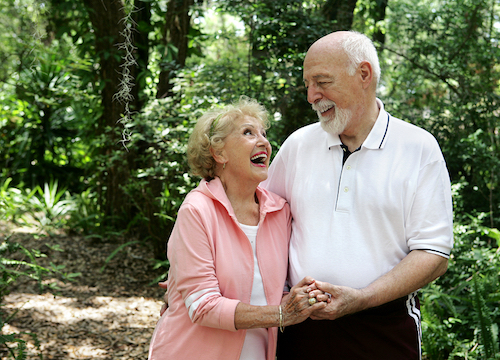 It’s a phrase familiar to many spouses: “happy wife, happy life”.
It’s a phrase familiar to many spouses: “happy wife, happy life”.
Researchers have confirmed that having a happy spouse can lead to a longer marriage, and now a new study has shown that it can lengthen your life too.
The study by a researcher in the Netherlands was published in the journal Psychological Science. It found that the life satisfaction experienced by a source was a better predictor of a person’s mortality than their own life satisfaction.
“It is well-known that the characteristics of individuals’ lifestyle are important for their health and longevity. Yet, what our lifestyle looks like – what we eat for dinner, whether we spend our evenings in front of the TV or go out for a walk, whether our fridge is staffed with fruit or ice cream – all these things are not only a result of our own choices and preferences but also the characteristics of our partner,” Olga Stavrova, author of the study, and a researcher at Tilburg University in the Netherlands told Theravive.
“If your partner is depressed and wants to spend the evening eating chips in front of the TV – that’s how your evening will probably end up looking like as well. Yet, spousal characteristics, such as their subjective well-being and personality, have been barely considered in longevity research before. I knew of a large dataset of American elderly that included the life satisfaction and mortality data of both partners (Health and Retirement Study) and set out to investigate the question of whether spousal well-being is associated with mortality,” she said.
In undertaking her research, Stavrova analysed data from a survey of 4,400 couples aged over 50 in the United States. 99 per cent of those who were surveyed with a spouse or live-in partner were heterosexual.
For a period of up to eight years, those involved in the survey, and their spouses, reported on their level of life satisfaction, as well as other factors like the frequency of their physical activity and their perceived level of partner support.
Participants were also asked to complete self-rated health measures and declare demographics like their gender, age at the beginning of the survey period, education, ethnicity and household income. During the period of the survey, deaths of participants or their spouses were tracked.
At the conclusion of the eight year survey period, around 16 per cent of those surveyed had died. Data showed that those who died were older, less educated, male, had less wealth, were in poorer health and were less physically active. The 16 per cent who died reported lower relationship satisfaction, as well as lower life satisfaction during the period of the survey. They also had a partner of spouse who reported having low life satisfaction.
Data showed that the spouses of the survey participants who died were also more like to die within the eight year survey period than the spouses of participant who remained alive.
The findings suggest that higher levels of spousal life satisfaction is associated with a lower mortality risk. This finding held even after accounting for variables like self-rated health and morbidity.
It has been well established that life satisfaction can influence certain behaviours surrounding diet and exercise that in turn can influence a person’s health. A person who has an active and happy spouse is also likely to lead an active lifestyle.
Stavrova explored two possible explanations for why having a happy spouse could influence life expectancy.
“First, having a happy partner might be good for one’s relationship satisfaction, which could further affect longevity. However, this was not the case. One’s relationship satisfaction with the partner was not associated with one’s longevity. Second, I tested whether happy partners are more likely to engage in physical exercise, which in turn is associated with an increased likelihood that individuals themselves will become physically active more often, which is known to be a protective factor against mortality. My analyses supported this idea: having a happy partner basically meant having a partner with a more active life style, which in turn affected individuals’ own life style and consequently their mortality,” she said.
Given the results of this research, Stavrova says it would be interesting to see whether similar impacts can be seen in other contexts.
“I would be interested in finding out whether this effect extends to other spousal characteristics (e.g., conscientiousness and self-control) and to the characteristics of individuals’ broader social circle, such as friends and colleagues: is the mental health of our friends and colleagues relevant for our physical health and longevity?”
Elizabeth Pratt is a medical journalist and producer. Her work has appeared on Healthline, The Huffington Post, Fox News, The Australian Broadcasting Corporation, The Sydney Morning Herald, News.com.au, Escape, The Cusp and Skyscanner. You can read more of her articles here. Or learn more about Elizabeth and contact her via her LinkedIn and Twitter profiles.